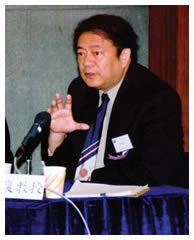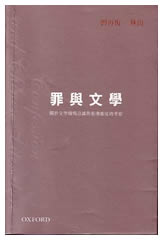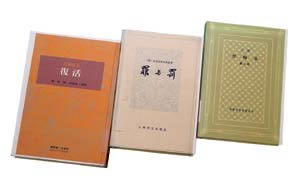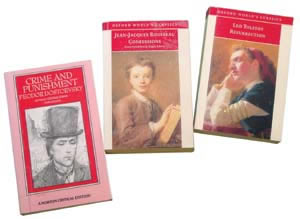Confession consciousness in Chinese literature
From the Bible and all the way to Resurrection, Crime and Punishment, and Portrait of the Artist as a Young Man, the theme of "confession consciousness" runs deep in Western literature. Yet in
Professor Liu was a visiting professor at CityU from September 2000 to October 2002. He is currently Honorary Professor in the University's Chinese Civilisation Centre. Before he left
Q: Given the vastness of the landscape of Chinese literature, what has prompted you to select "confession consciousness" as a focus of study?
A: In the late 1980s, the
Back then Professor Lin Gang and I planned to do more research on this topic after the publication of Tradition and the Chinese People. Obviously, in choosing this topic we weren't doing academic work for its own sake. We had in mind a certain specificity of history. We wanted to raise pointed questions about the spiritual dilemmas of our time. That was our burning desire. Q: What do you mean by "specificity of history" and what are you specifying? A: The history that I am referring to is the epoch that has just passed us by. It is
Q: What is confession consciousness?
A: Right from the beginning of our book Sin and Literature, we made it clear that we should bear two kinds of responsibilities in life, one legal and the other moral. For instance, we commit no crime if we do not save somebody from dying. We have no legal responsibility, but we have a moral responsibility. We can say, therefore, that a legal responsibility is a moral demand at the minimum level. On the other hand, moral responsibility has no limit, and it touches on the deepest part of our inner world. It is the conscience of our soul. Making a confession is making a judgment of one's own conscience. It is in this sense that in every confession the self is engaged in a dialogue between the judge and the judged. A solemn theme of the soul, confession continually strives to attain ever higher levels of spiritual living.
Q: Given that confession consciousness is an important theme in Western literature, could you briefly describe its various lines of development?
A: Confession consciousness has a very long history in the West. The themes of confession and redemption recur frequently in Western literature, starting with the notion of "original sin" in Christianity. So we may regard the Bible as a work of the literature of redemption. The Bible has inspired many works in the literature of confession. The earliest work in this genre may be the Confessions of St Augustine in the 4th century AD. In the modern era we have Rousseau's Confessions in the 18th century and in the 19th, Tolstoy's Confession and Resurrection, and Zola's Claude's Confession. In the 20th century, we have Joyce's Portrait of the Artist as a Young Man.
There are numerous literary works that are steeped in confession consciousness but not avowedly so, such as Dostoevsky's Crime and Punishment and the reflexive works on war by Heinrich Boll, the German Nobel Laureate in Literature. Authors with a consciousness of confession are often able to penetrate the inner world and explore the depths of human nature.Q: Is confession consciousness also present in Chinese literature? If so, how does it compare with that in Western literature?
A: Archetypal works of confession consciousness did not exist in Chinese literature prior to Cao Xueqin's The Dream of the Red Chamber. Although weak sentiments of confession can be detected in works like Peacocks Flying Southeast and Lu You's Phoenix Hair Pin, one cannot find in them discussion and debate at the depth of the soul. The Dream of the Red Chamber is an exceptional case because it accords us a sense of debate involving two systems of values. The two maidens of the novel, Xue Baochai and Lin Daiyu are, respectively, the two horns of author Cao Xueqin's dilemma of the soul. The former, Maiden Xue, represents those values espoused by the Confucius and Mencius school of thought, which emphasized order and hierarchy in human affairs. The latter, Maiden Lin, represents the values espoused by the Lao Zi and Zhuang Zi school of thought, which cherishes nature and life. As both equally have their worth, one cannot say one is right and the other wrong. This is what I mean by discussion and debate at the level of the soul. The soul of Cao Xueqin himself is incarnated in Jia Baoyu (the tragic male who was caught between the two maidens). Through The Dream of the Red Chamber, Cao Xueqin wanted to make the point that we are all responsible for the ensuing tragedy. And Cao obviously inclined towards the value of life because he loved only Maiden Lin.
An important premise of confession consciousness is that all human relationships are interrelated. Tragedies sometimes result from people's good will, not from evil. Examined from a secular point of view, Lin Daiyu was a victim of the feudal institution; but the fact is, everyone related to her bore some responsibility for her fate. Yet this sin of ours is not a legal crime; rather, it is a crime of the conscience, "a crime without crime". This is exactly what Wang Guowei (a Chinese scholar in the late 19th and early 20th centuries) said, that Lin Daiyu's tragedy was the result of communal relationships that bind people together. Lu Xun also says that The Dream of the Red Chamber does not resemble modern accusation novels, because the author and the characters he constructed confessed collectively. Only a literary work of such nature and depth can really move readers. That is why I regard The Dream of the Red Chamber as an infinitely huge treasury of art, at once devoid of truth and pretense, good and evil, right and wrong, cause and effect, borders and margins. There are also some works in modern Chinese literature that do possess confession consciousness, such as Lu Xun's Diary of a Mad Man and Medicine. Guilty feelings occasionally surface, though somewhat superficially, in the works of Guo Moruo, Yu Dafu and others.
Q: Why has there not been a deep and soul-searching tradition of confession?
A: The main reason has to do with the fact that there's no significant history of soul searching in Chinese culture. Discourse of the soul is not of concern in Confucianism-the mainstream of Chinese culture. Although Zhuang Zi was the first thinker in Chinese culture to question the meaning of man's existence and the reality of life, self-enquiry was actually a passive, negative kind of inquisition. In the course of his introspection, he destroyed all boundaries separating life and death, truth and pretense, and blessings and crises, and his questioning emptied all contradictions and confrontations in the mind. Writers influenced by Taoist thought might pursue answers to questions about life, but they tended not to be inquisitive about their soul, nor did they feel any pressing concerns about body and soul. The West, under the influence of religion, has obvious godly and spiritual worlds.The contemporary Chinese philosopher, Li Zehou, has put it well: Chinese culture is of one world whereas Western culture is of two worlds. Put in another way, Chinese culture is of Man, a culture without God, a culture in which no dichotomy exists between Man and God, between the soul and the flesh, or between a real world and a transcendental one. Consequently, our literature portrays one dimension, that of reality. Lacking a transcendental dimension, the depth of our soul is deprived of a forum for debate and discourse.
Q: Suppose we use confession consciousness as a yardstick and review China's literary tradition, do you think that Chinese literature is less exciting, or less profound, than Western literature?
A: I am not denying the strengths in China's literary tradition. Chinese and Western literature have their own strengths. Our purpose in putting forth this literary perspective, which is well developed in the West, is to use it as a frame of reference which may help us in better understanding the intrinsic characteristics, and even weakness of our own literature, so that our literature can move a step forward. Comparing the two traditions, it is not difficult for us to discover that, although "rustic sentiments" and misgivings about life abound in Chinese literature, there are no "cries in the wilderness" to speak of-there are no soul-to-soul discussions and dialogues.
Q: Given the lack of soul-searching history in Chinese culture, and given all that we have is this side of the world we live in, what then can Chinese writers do to extend the realm of spirituality along the dimension of soul-searching?
A: At the very least, our fellow Chinese writers may acquire this sense of [confession] consciousness, and in a spirit of immense benevolence, probe deep into our hearts. As in The Dream of the Red Chamber, it is possible to hold a debate between the two value systems. Seeing this very possibility can be, in itself, exciting. We usually make use of a certain twist of the plot alluding to a certain moral lesson, and literature has become a political or ethical vessel. Such narratives may suit for anecdotal storytelling but they don't make the grade as literature. So, perhaps, our book sets the scene for another round in the theory of Chinese literature. I hope future writers who have read our book will be able to bare their souls to the reader.
Q: Now that this research is over, what have you discovered?
A: For almost a century China's achievements in modern literature have lagged far behind those of the West. There are fundamental, theoretical, and spiritual reasons for this. We discovered one cause in our research: it is that Chinese people have some fundamental flaws in how they see the function and role of literature. Chinese people tend to expect literature to take up a secular role, or, like revolutionaries, go about solving all sorts of social problems. These are not what literature should deal with.
Hence, we have come to stress in the book that in the final analysis there is no utility in literature. Should there be of any use at all, then it can only be what Wang Guowei called a "useless utility", meaning that, people would somehow be affected spiritually and emotionally after they read a literary work. That's the most that literature can be: a mere "useless utility." That's also why we should not put too heavy a demand on literature and turn it into solutions to social problems. Nor should we ever delude ourselves that writers can become engineers of the soul. Literature should be what it should be: the freest territory and the form of existence of free emotions and feelings. On this point, Lu Xun once said, "Without a lofty, freewheeling spirit, there is no great art." Authors must have a high degree of freedom.
Q: Your findings are incisive indeed. Could you talk about your research method?
A: My approach in my research has always been that first, I focus on my artistic feelings and emotions, followed by intellectual discoveries, and finally by academic expression. A unity of three. People who work on the theory of literature generally lack feeling for the arts and are only good at logical thinking. But this is not enough for literary criticism, so we demand artistic and intellectual discoveries as well.
In my opinion, there are two strands running through the entire landscape of Chinese literature. The first is a historio-cultural lineage, which is historical, political, familial and nationalistic in nature. The other lineage is living-cultural, the nature of which is cosmic, natural, and philosophical. I especially like the latter one. The way I see it, the context of life is larger than the contexts of history, the family and the state; for the context of life is the context of the cosmos. It is also because our lives constitute one internal cosmos that is endless and boundless. We should therefore take the plunge internally and relentlessly fathom our own soul. The deeper we reach, the better we will be able to channel with the cosmos, and the more able we are to appreciate and comprehend the most fundamental and the most important thing. Turn around and face this magnificent life, and don't be bogged down anymore by the narrative contexts of society, the family or the state-such is the hope we have for this book.
Q: Did you encounter many difficulties when you ventured into untreaded territory of literature?
A: In terms of method this book is a piece of work that is "historically and theoretically integrated". That imposes considerable difficulties on us. Really, it would be easier for us to go about writing either pure theories and leave out the historical stuff, or target things historic and not be bothered with the theories. We attempt to cover in this book on the one hand a suitable interpretation of the spiritual core of Chinese culture, and, on the other, a macroscopic comparison between the history of confession literature in
Q: Is there any practical significance nowadays in undertaking literature research on this subject?
A: My purpose in writing this book has been mainly to take "confession consciousness" as the point of departure and indicate the necessity for literature to have a dimension of the soul-that is, the depth of human nature. I believe that confession consciousness will never be something pass? because it is the cry of our conscience within our heart.



